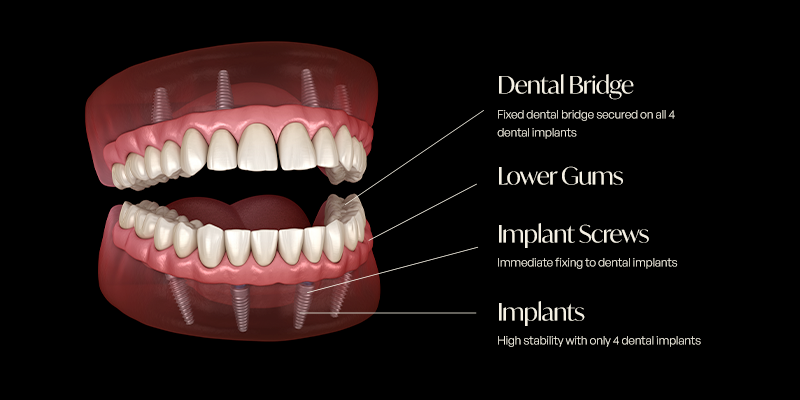Book an appointment
or ask a question
Leave your details here and a member of our team will be in touch momentarily.
Bone Atrophy & All-On-4
For patients whose teeth have been extracted, fallen out, or those who have left severe gum disease untreated, many of these patients experience wasting of the bone. This is also known as bone atrophy and will occur around the extraction site or where there has been a loss of a tooth that has not been replaced or addressed.
Some symptoms of long-term bone atrophy include a sunken or collapsed-appearing face, distortion of the facial features, signs displaying premature ageing, as well as a range of other cosmetic concerns.
A lot of patients that have experienced bone atrophy due to tooth loss or gum disease are unsuitable candidates for traditional dental implants due to the lack of bone volume remaining and declined structure.
Dissimilar to traditional dental implants, the All-On-4 dental implant system utilises zygomatic implants (zygoma), therefore, making it possible for unsuitable candidates to receive dental implants even with severe bone atrophy and extremely diminished jaw bone structures.
This is because zygoma implants are longer than traditional dental implants. Dr Wong works with an oral and maxillofacial surgeon during the surgery to anchor the implant into the underside of the cheekbone and through the sinuses, meaning the areas where the bone is unstable or severely shrunken will be avoided, resulting in no requirement for bone grafting.
All-On-4 Consultations
During your journey to receiving All-On-4 dental implants, Dr Wong will first begin with a consultation and move forward to a diagnosis before proceeding with the surgery.
During your initial consultation, you will have the opportunity to discuss your concerns with your smile and ask any questions you may have. The diagnosis will then involve Dr Wong establishing the current state of your oral health and determining if you are a suitable candidate for All-On-4. She will also perform oral health assessments to assist with the diagnosis, which may include oral imaging and scans.
Unlike dental implants which take 3-6 months to heal and fuse to the mouth, the All-On-4 surgery will be completed in a day. Once your new teeth are fitted, Dr Jaclyn Wong will discuss the post-operative instructions you must follow and address any final questions you may have.
What are the benefits of All-On-4?
One of the key advantages of All-On-4 is that the teeth are inserted within 12 to 24 hours of surgery, which means an immediate tooth replacement for the patient. All-On-4 also offers several other benefits to patients with multiple missing teeth, including:
- Replaces a full arch of teeth with four implants
- Does not require bone grafting or a separate procedure
- Shorter recovery time and minimal work leave required
- Fewer complications associated with the procedure
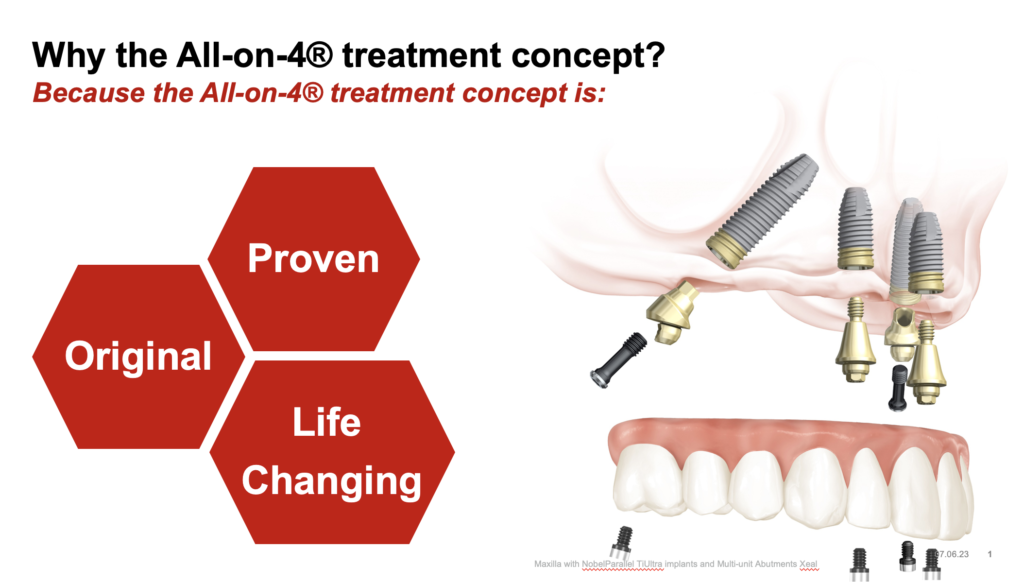
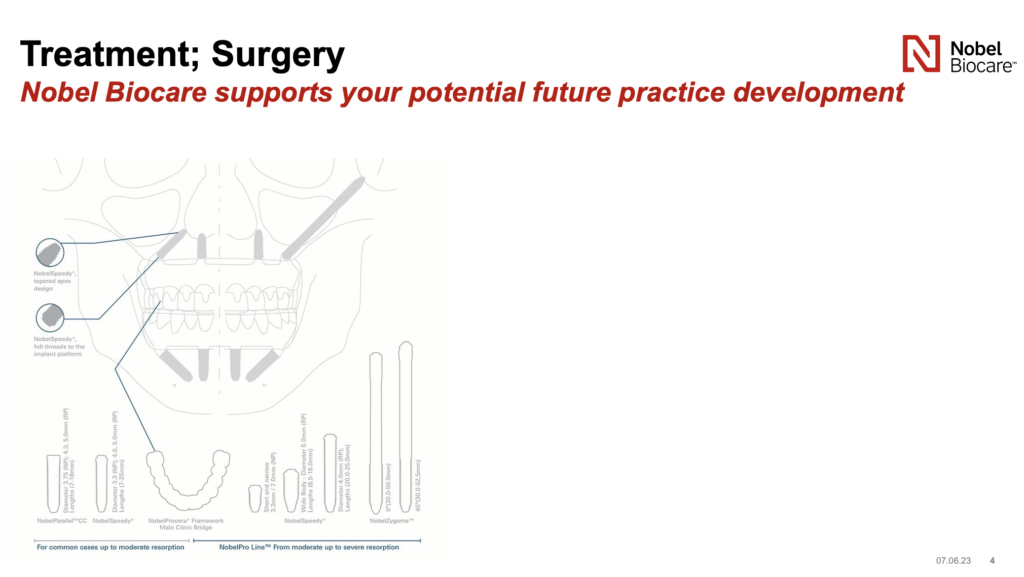
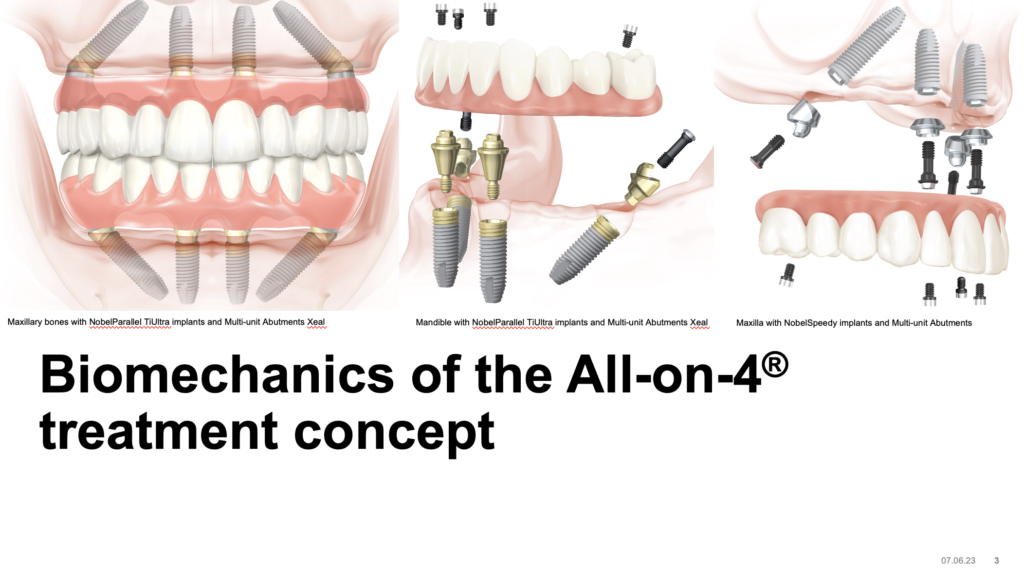
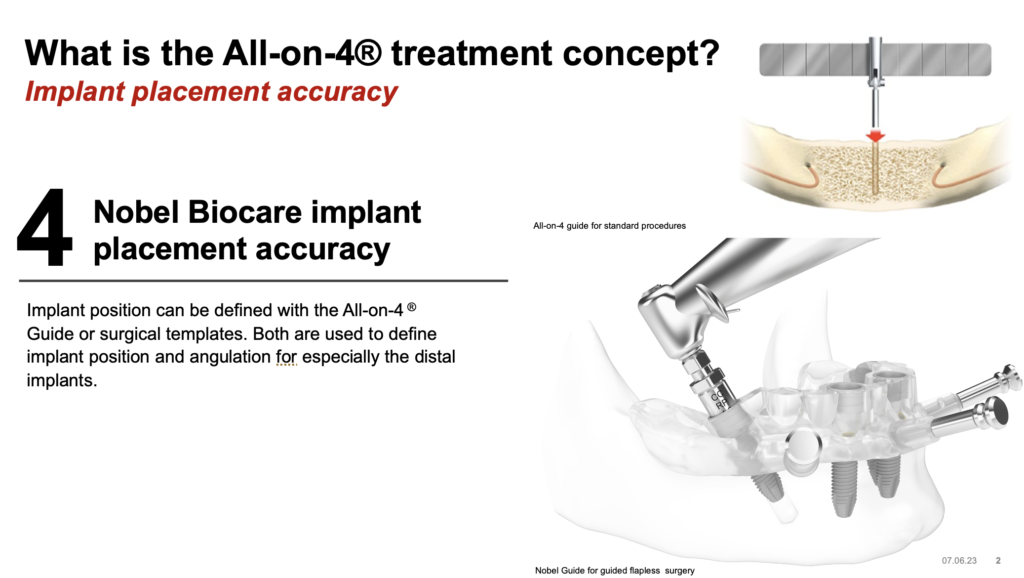
All-On-4 FAQs
Once the dental implants are secured in your jawbone, it is not possible for you to remove them.
However, should the need arise, a qualified dental surgeon would be able to do so. The artificial teeth attached to your dental implants can be removed by your dental surgeon at your check-up and clean. This is usually performed yearly to allow cleaning around the implants under the bridge and to monitor gum and bone health.
Just as with conventional dental implants, All-on-4™ dental implants should last anywhere from 10 to 25 years and usually even longer. This, of course, depends on your oral health and commitment to excellent hygiene techniques and regular attendance for professional cleans.
In order to be eligible for All-on-4™, it is important that you are in good oral health and have adequate jawbone density for the placement of dental implants. Usually, most or all of the remaining teeth are not able to be saved when considering All-on-4™ surgery as it is a form of full-arch rehabilitation.
Whilst it is possible to create adequate jawbone density with bone grafting, the results are neither as reliable nor as predictable.
During a consultation, Dr Jaclyn Wong can assess your oral health and determine what the best treatment option is for you.
All-on-4™ dental implants differ from dentures in that they involve the placement of four implants in the jawbone to support a fixed dental prosthesis, providing stability, improved chewing efficiency, and bone preservation. The prosthesis is cared for like natural teeth and the implants can last for years. In contrast, dentures are removable prosthetic devices that rest on the gums and might require adhesive. Dentures lack direct stimulation to the jawbone and can lead to bone loss over time, affecting facial appearance and stability.
The All-on-4™ dental technique differs from traditional implant techniques primarily in the number of implants used, treatment time, complexity, and benefits. All-on-4™ employs four strategically placed implants per arch for efficiency and stability, often allowing for immediate attachment of a provisional prosthesis and quicker return to normal function. This approach is designed to reduce the need for extensive bone grafting and streamline the treatment process. In contrast, traditional implant techniques involve a larger number of implants, potentially requiring longer healing periods and more appointments, and may necessitate bone grafting for cases of significant bone loss. The choice between the two approaches depends on individual considerations such as oral health, bone condition, and treatment goals.
To determine if you are a candidate for the All-on-4™ dental implant technique, you should consult with a qualified oral surgeon or implant dentist. Generally, you might be suitable if you have lost most or all of your teeth in one or both arches, have sufficient jawbone density to support the implants (though bone loss can often be accommodated), are in good overall health or have well-managed medical conditions, are a non-smoker, desire a fixed set of teeth, commit to maintaining oral hygiene, have realistic expectations, and undergo a thorough evaluation by the dental professional, including necessary imaging. Each case is unique, so a personalised assessment is essential to determine your candidacy for this approach to tooth replacement.
On the 25th anniversary of All-on-4 surgery, Dr. Wong received a prestigious Centre of Excellence award from Nobel Biocare Australia, underscoring her dedication to dental surgery. The lifespan of All-on-4 implants varies based on factors like oral health and maintenance. With proper care and check-ups, they can last for many years or even a lifetime. Adhering to good oral hygiene, avoiding habits like teeth grinding, and maintaining a healthy lifestyle contribute to their success. Regular dentist visits are essential for monitoring implant conditions and addressing issues promptly.
The All-on-4 procedure is typically not painful due to the use of local anaesthesia during the surgery. Local anaesthesia numbs the treatment area, ensuring that patients do not feel pain or discomfort during the placement of the dental implants. Additionally, many dental professionals may offer sedation options to help patients relax during the procedure. While patients may experience some swelling, discomfort, or minor pain after the surgery, these symptoms are usually manageable with prescribed medications, and they tend to subside as the healing process progresses. It’s important to follow post-operative care instructions provided by the dentist to minimise any potential discomfort and promote optimal healing. Overall, advancements in dental technology and anaesthesia techniques contribute to making the All-on-4 procedure a well-tolerated and relatively comfortable experience for patients.
The All-on-4 oral surgery technique is widely recognised in the field of dental implants due to its ability to provide various advantages for individuals dealing with extensive tooth loss or severe dental issues. Some of these benefits encompass immediate outcomes, increased self-confidence, improved speech and chewing capabilities, long-term durability, the preservation of jawbone density, minimal discomfort, cost-efficiency, simplified upkeep, and the restoration of facial aesthetics. It represents a convenient and tailor-made solution for those in search of a permanent, functional, and aesthetically pleasing smile. To determine if All-on-4 is a suitable option, it is advisable to consult with a dental professional.
To care for All-on-4 dental implants, maintain rigorous oral hygiene by brushing your teeth at least twice daily with a soft-bristled toothbrush and using the recommended toothpaste. Additionally, floss daily, employing a floss threader or interdental brush to clean between teeth and around implants. Rinse with an antimicrobial or fluoride mouthwash, attend regular check-ups for professional cleanings, and avoid harmful habits like smoking and excessive alcohol consumption. Be mindful of your diet, avoiding overly hard or sticky foods, and if your prosthetic is removable, follow specific cleaning instructions. Attend follow-up appointments, promptly report any issues, and protect your implants during activities that pose a risk of facial injury. Consistent adherence to these practices, along with open communication with your dentist, ensures the optimal health and longevity of your All-on-4 dental implants.
Yes, one of the significant advantages of All-on-4 dental implants is that they provide stable support, allowing you to eat normally and enjoy a wide variety of foods. The implants are designed to withstand the forces of biting and chewing, providing a secure foundation for the prosthetic teeth. However, it’s advisable to be mindful of your diet and avoid excessively hard or sticky foods that could potentially strain the prosthetic and natural teeth. Following your dentist’s recommendations for care and maintenance will help ensure the long-term success of your All-on-4 dental implants, allowing you to eat comfortably and enjoy a diverse range of foods.
The All-on-4 dental implant procedure is often completed in a single day, making it a same-day solution for individuals with missing teeth. The process typically involves consultation, treatment planning, implant placement, and the attachment of a temporary set of teeth all on the same day. However, it’s important to note that the entire treatment timeline can vary based on individual factors, including the patient’s oral health, the need for any additional procedures such as extractions or bone grafts, and the specific treatment plan. While the initial phase may be completed in a day, the full process, including the placement of permanent teeth, may take several months to allow for proper healing and integration of the implants with the jawbone.
If you would like more information, or to request an appointment with Dr Jaclyn Wong, please contact us today.

